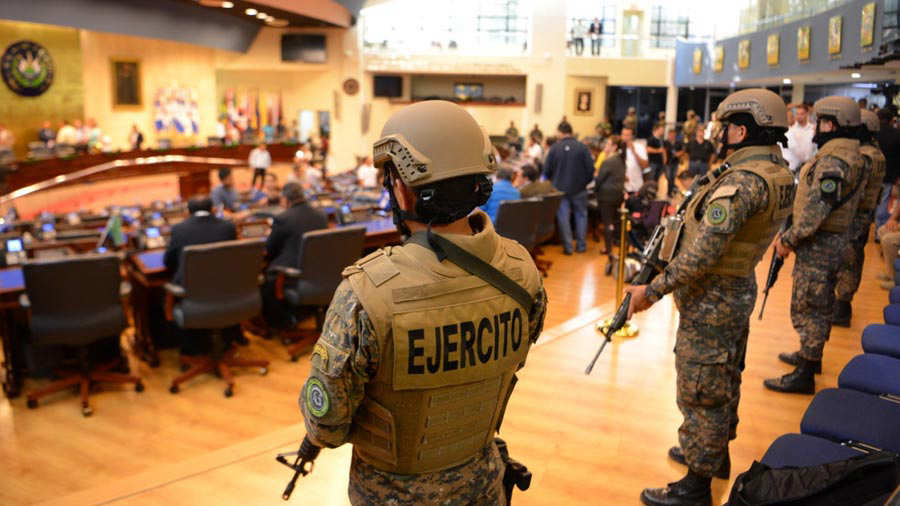
El Salvador Assembly calls military intervention lead by President "a coup"
As El Salvador Assembly calls Sunday military intervention "a coup", here are some Keys to understand the occupation of the legislature and how it ties to the…
On Feb. 9, El Salvador experienced an unprecedented event when the Assembly was taken over by the Army and the Police, under President Nayib Bukele orders.
The Council of Ministers had called all deputies to an extraordinary plenary session to discuss the $109 million loan that would finance phase III of the Territorial Control Plan —which seeks to control penal centers, interrupt financing to organized crime and strengthen security forces.
Bukele arrived at the"Salon Azul" escorted by military and police forces, congratulating the deputies who had attended the meeting and saying:
"Now I think it is very clear who is in control of the situation. And the decision we are going to make now, we are going to put it in God's hands. Let's say a prayer".
According to national media, the president warned the parliamentarians that if in a week they do not approve the loan, he will give the "people" the power to take over the Assembly.
Then he sat down, looked at the ceiling, said a prayer and without a word, he abruptly got up from his chair, walked past all the deputies, who looked at him in astonishment, and left.
He returned to the platform where the citizens -he had previously summoned on February 6th, awaited for him, and told them what "God had manifested to him in his prayer.
During Nayib Bukele presidential campaign, he promised to bring down El Salvador's homicide rate, one of the highest in the world, and the Territorial Control Plan was born.
Inaugurated in June 2019, the first phase was completely financed by the State. A month later, the cost of the second phase was set at 152 million dollars.
But the conflict between the two legislative bodies didn't begin until the disbursement of the funds for phase III, following the convening of the extraordinary plenary session.
Feb. 6
President Bukele announces that the Council of Ministers is convening an extraordinary meeting of the Assembly on Sunday, February 9, to vote on the $109 million security loan.
In view of this, the President of Congress, Mario Ponce, calls a plenary session on Friday, February 7.
Feb. 7
President Bukele calls on the Salvadoran people to meet on Sunday, February 9, outside the National Assembly.
Half an hour later, the president of the Assembly asks the deputies to meet during the afternoon to discuss the loan.
Feb. 8
Ponce calls another plenary meeting at 8:30 p.m. local time. But due to lack of quorum, it is canceled and a new session is rescheduled for Monday, February 10.
Meanwhile, Bukele decides to militarize the area around the Legislative Palace, thus discrediting those responsible for the security of the Assembly.
Feb. 9
With the prerogative of doubling security, Bukele orders soldiers, police, and snipers to enter the Assembly, where dozens of deputies were set to discuss the loan.
Despite the fact that many have described Bukele's use of military force as unconstitutional, the president maintains the position that the executive branch has the power to "extraordinarily convoke the Legislative Assembly, when the interests of the Republic demand it," based on Article 167 of the Salvadoran Constitution
However, assembly members, constitutional lawyers and organizations point out that what he did was"inappropriate," because that measure only applies in "national catastrophes or threats to sovereignty".
For this reason, two citizens filed a lawsuit against Bukele for unconstitutionality before the Constitutional Chamber of the Supreme Court of Justice, in which they ask for an "urgent" precautionary measure.
RELATED CONTENT
But Bukele has no regrets.
In an interview with Spanish newspaper El País, the Salvadoran president described the military intervention inside the "Salon Azul" as "an act of presence," and said
"If I were a dictator or someone who didn't respect democracy, I would have taken control of everything right away."
"The people were angry when I asked for calm, but if I had wanted to I would have taken control of the whole government tonight. (...) We have every chance to do what the people were asking me to do," Bukele added.
Human Rights Watch's director for the Americas, José Miguel Vivanco, disagrees
Through his Twitter account, Vivanco called the president's actions a "show of brute force" and asked for the intervention of the Organization of American States (OAS), questioning the head of state concept of democracy.
Likewise, U.S. Ambassador to El Salvador Ronald Johnson urged the legislators to "dialogue in search of consensus and to remain calm.
No apruebo la presencia de la @FUERZARMADA en la @AsambleaSV ayer y me sentí aliviado que esa tensa situación terminó sin violencia. Ahora reconozco los llamados a la paciencia y la prudencia. Me uno a todos los actores que están pidiendo un dialogo pacifico para avanzar.
— Embajador Ronald Johnson (@USAmbSV) February 10, 2020
A more neutral approach than that of the Chairman of the U.S. Congressional Foreign Relations Committee, Eliot Engel, who pointed out the critical moment El Salvador is going through and reminded legislators that "The eyes of the world are on El Salvador and Nayib Bukele.
"The Salvadoran Army should not be used to resolve disputes between the President and the Assembly. Differences between civilians should be resolved by civilian institutions," the official said, according to the Twitter account of the committee he chairs.
On Monday, lawmakers held an emergency session, where the Assembly President Mario Ponce called Bukele’s actions "an attempted coup".
The meeting previously set on Feb.8, was canceled as Ponce asked a legislative commission to investigate Sunday's incident.
Meanwhile, President Bukele mocked Ponce on Twitter and proclaimed his security plan effectivity by announcing that there had not been a single murder reported on Monday.
In the midtime, the people of El Salvador are divided between those who protests Bukele’s actions and that whose support reaches social media grounds.











LEAVE A COMMENT: